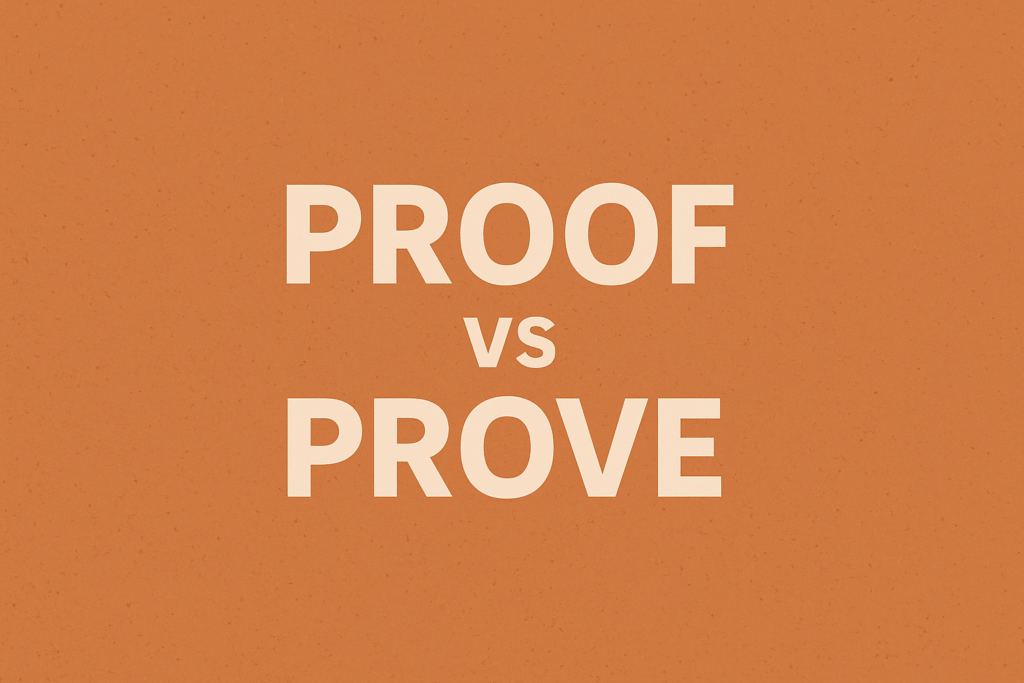Proof vs Prove

If you’ve ever mixed up proof vs prove, you’re not alone. These two words are closely related but serve entirely different grammatical functions. “Proof” is a noun, while “prove” is a verb, a difference that significantly affects how they’re used in sentences.
English learners often get confused when trying to form statements about evidence, results, or the act of demonstrating something. For instance, should you say, “I need a prove” or “I need proof”? The correct word depends on what you’re trying to say and the role that word plays in the sentence.
This article will help you understand the difference between proof vs prove, provide real-life examples, highlight common mistakes, and offer tips to help you remember which to use and when. Let’s dive in.
Grammatical Explanation of proof vs prove
The key difference between proof vs prove lies in their parts of speech:
- “Proof” is a noun. It refers to evidence or facts that show something is true.
Example: The detective found proof of the suspect’s guilt. - “Prove” is a verb. It means to demonstrate or establish the truth of something.
Example: You must prove your identity before entering.
You need proof (a thing), but you have to prove (take action) to produce it.
Forms of the verb “prove” include:
- Present: prove
- Past: proved
- Past participle: proved or proven (both are correct in modern usage)
In summary:
- Use “proof” when talking about the evidence itself.
- Use “prove” when referring to the act of demonstrating truth.
In the context of proof vs prove, knowing the distinction between a noun and a verb will help you use each word properly.
Real-Life Examples of Proof vs Prove
Correct Usage of “Proof” (Noun):
- I need solid proof before I make a decision.
- She showed the receipt as proof of purchase.
- There is no proof that he was there.
Incorrect Usage of “Proof”:
- I need a prove of your identity. (Should be “proof”)
- This photo will prove as a proof. (Redundant and awkward)
Correct Usage of “Prove” (Verb):
- They must prove they are qualified for the job.
- Can you prove that theory?
- This experiment will prove our hypothesis.
Incorrect Usage of “Prove”:
- She gave me a prove of her skills. (Should be “proof”)
- The lawyer had to proof his point. (Should be “prove”)
Understanding proof vs prove through examples helps clarify how each word functions in context.
Common Mistakes
A common error is using “prove” as a noun or “proof” as a verb. For example:
- Incorrect: “He showed me a prove of his work.”
- Correct: “He showed me proof of his work.”
Another mistake is confusing verb tense forms of “prove”, especially between “proved” and “proven.” While both are acceptable as past participles, they differ in tone:
- “He has proven himself.” (More formal)
- “He has proved his point.” (More common)
Also, be cautious not to use “proof” where a verb is needed:
- Incorrect: This will proof your strength.
- Correct: This will prove your strength.
These mix-ups can easily be avoided by identifying whether you need a noun or a verb in your sentence when discussing proof vs prove.
For more tips, Grammar/Usage Confusion Spelling Confusion
Memory Tips
To remember the difference between proof vs prove, try these simple tips:
- Proof = Noun (a fact or evidence)
Tip: “Proof” ends in “f” like “fact.” Both are things you can point to. - Prove = Verb (an action)
Tip: “Prove” has an “e” like “exercise” it’s something you do. - Visual Cue:
Imagine this:
You prove something to get the proof. - Mnemonic:
“To prove your point, you need proof.”
Using grammar anchors like parts of speech and root words makes it easier to pick the right word in any situation.
Conclusion
The difference between proof vs prove is simple once you know that one is a noun and the other is a verb. “Proof” is the evidence or result, while “prove” is the action taken to demonstrate something. Keeping this distinction in mind will help you communicate more clearly and accurately in both writing and speech.
For more insights on commonly confused word pairs, check out this helpful guide from Merriam-Webster on confusing grammar.